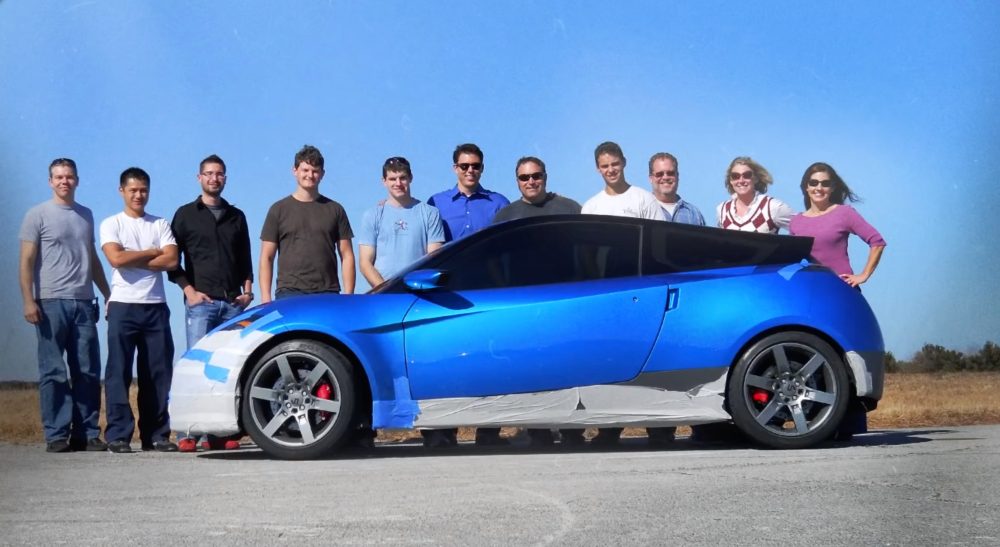Rivian posted a new video covering some of the company’s history, mission, and background today.
In it, Rivian CEO RJ Scaringe and several of the company’s top engineers talk about the challenges that the company has faced and will face in the future.
The primary focus of the video is on the eternal question for electric car startups: how are we going to clean up transportation in a way that lets us get around and enjoy ourselves while doing less damage to the planet? And how are we going to start a company from nothing to get to that point?
Scaringe starts the video with some familiar statements to anyone who’s been paying attention to the other media darling electric car company CEO for the last few years.
He points out that the upcoming R1S SUV “accelerates faster than almost every Ferrari ever made,” but says that even with specs like these, the car industry is “a business with a very low probability of success…your first dollar of revenue comes after spending $3 billion.”
But we really have no choice in the matter, according to Scaringe. We are “leveraging sources of energy that accumulate in our planet for 200 to 300 million years, and we as humanity, in less than 150 years, have used more than half of it…it’s simply not a choice to move off of fossil fuels.” So despite the difficulty of building a car company, Rivian and the like need to take that challenge and run with it and hope to succeed.
This is what drove Scaringe to start Rivian, which originally spent two years working on a sportscar (once again, like the other electric car company that started with a sportscar). At the time, the company was operating in “stealth mode,” so this sportscar work was all done in secret.

And that secret was well-kept, as the company operated for 8 years without public awareness until they got a factory in 2017. Some early employees shared that when friends and family asked what they were working on, their non-answers were met with skepticism (“That’s not a real company. You’re not working.”).
They soon decided that a sportscar wasn’t right – that the company could do better with a bigger vision. So they scrapped all that work and decided to build a truck.
One engineer thinks that customers’ initial reaction will be “ahhh….shit, this is fast!” Another waxed poetic about taking the truck out into nature, where “all you’re gonna hear is the wheels on the dirt as you’re driving through the open expanse.”
Scaringe said that “the wrong answer is to tell people that want SUVs and trucks that they have to drive really small electric cars, the right answer is to say ‘drive the vehicle that you want…oh by the way, this now has a path to carbon zero’.”
Rivian is getting to that point with a modular, scalable platform that they’re using to open up other design possibilities. One of these is the Amazon delivery van they’ve been contracted to build 100,000 of.
And they’ve hired engineers from several high tech companies from various industries. In the video, engineers from McLaren, Netflix, Intel, Tesla, and Apple said some of their thoughts on their new project at Rivian.
That project has grown from a garage with a few people in it to a company with about 2,000 employees and a 2.6 million square foot factory, ready to build adventure trucks with the goal to “rethink the SUV space” and switch it off of fossil fuels.
Electrek’s Take
Well, it’s obviously just a brand video, so it’s going to be a lot of rosy marketing-speak. But we’re really excited about what Rivian is doing here, taking some of the most polluting vehicles and trying to figure out a way to make them less-polluting and a lot better.
They’ve certainly had an effect on the industry, too, attracting investment from Ford and promises of challengers from GM. So it looks like, even before the first truck gets on the road, they’ve had some success.
We can’t wait to drive it and have the reactions the engineers told us about above. But unfortunately, we’ll have to until the end of this year – if they can meet their production schedule.
It looks like Rivian will release more videos in the same series, so check out their first video below and stay tuned for more:
FTC: We use income earning auto affiliate links. More.
Subscribe to Electrek on YouTube for exclusive videos and subscribe to the podcast.